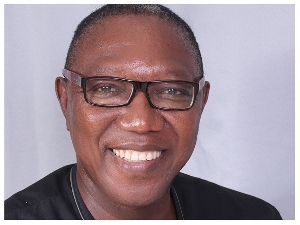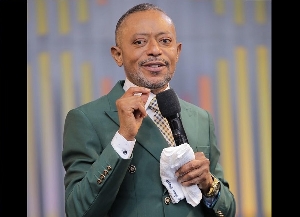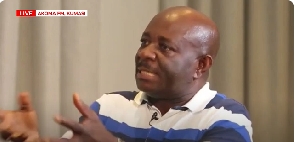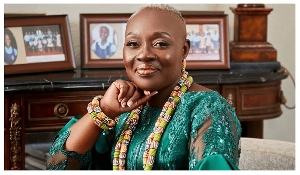Introduction
There is no time to waste. The longer we wait the stronger will be the hold on African of neo-colonialism and imperialism. A union government for Africa does not mean the loss of sovereignty by independent African states. A union government will rather strengthen the sovereignty of the individual states within the Union (Kwame Nkrumah, Accra, 24 May, 1964). Nkrumah’s vision and dream did not die with him. Quite the contrary: they remained very much alive throughout the years. The city of Accra, Ghana’s capital is been given a facelift in preparation for the African Union (AU) summit in the first week of July. The summit will be dedicated to debating and deciding the shape and direction which the five-year-old continental body should take. Simply put, the future of Africa is at stake here. But in characteristic African fashion, lavish spending is occurring in the good name of African unity. The Government of Ghana has built an AU village (at the La wireless site) where the African leaders will stay. The Ghana@50 secretariat has spend about US$5.9(part of the US$20million Jubilee money) on some luxury-brand cars; 30 S-Type Jaguar, 50 E-Class Mercedes-Benz, 50 BMWs, 30 Chrysler 300C, 50 Peugeots and 25 buses to convey the visiting leaders. Again we will witness the usual carnival mood, with grand speeches lace with Pan-African jargons, sumptuous banquets and perhaps nothing of substance at the end. Fifty years after the beginning of the independence struggle, Africa’s prospects are bleaker than ever before. The headlines of the World's press are frequently filled with woe. Millions of young Africans are constantly struggling to reach Europe – the so-called promise land – by the sea, millions of Africans are dying from malaria and more than half of Africa’s population has been ravaged by HIV/AIDS. Several reports have also forecasted difficult times ahead. Even though Africa is the least polluter in the world in terms of carbon emissions, the ‘experts’ say that Africa will be the worst hit by climate change. A Christian Aid report in May 2006 suggested that up to 182million people in sub-Saharan Africa could die of diseases directly attributable to climate change by the end of the century. Another report by Nick Stern, head of the UK Government Economic Policy, released in October 2006 was even more alarming.Commentators, ‘experts’, academics and activists routinely accompany their gloomy prognostications with calls for greater involvement of western governments in Africa.We are told that Africa is the world’s poorest region and that we are falling further and further behind all other regions. Half of Africa’s 930million people live on less than US$1 a day. Africa’s share of world trade has declined to half of what it was in the 1980s amounting to only 1.6 per cent. Further, Africa is the only region where school enrolment is falling and illiteracy is still commonplace. Above all the scourge of HIV/AIDS has inflicted a terrible additional burden. Sub-Saharan Africa is the only region of the world where the United Nations (U.N.) can fulfil its mandate in all its breadth. Aid to refugees (more than 16 million refugees and displaced persons), assistance to children, food aid, peacekeeping, environmental protection, human rights advocacy, development planning – it’s here new development theories are also experimented.
Reversing this condition is possible, but only through bold action on continental unity, more interaction between African states. The prospects of Africa escaping from precipitous decline will depend on Africa’s ability to integrate the various economies and NOT on Western ‘aid’. Constructive interaction of African states remains an elusive goal. Since the 1960s when the most ambitious proposal(s) on a Union Government for Africa was put forward by Dr.Kwame Nkrumah, several efforts have been made but to no avail. Today, Africans are no where near that common objective of a Union Government. However, after forty years of States doing things solo, is there any need for continental integration? What are the constraints against continental integration? What role can civil society play in the integration process? This piece is a contribution to the “Grand Debate on the Union Government”.The need for continental integration
It is now clear, more than it was in the 1960s of the need for continental integration. The magnitudes of the annual crisis engulfing Africa are too great for individual African states to resolve by themselves. Bar for a few states, hardly most of the African states can sustain a credible national development strategy without major inputs from the west. Most states are effectively bankrupt (misleadingly labelled HIPC by the World Bank), and barely able to raise sufficient funds on their own account to provide a minimum of public services. African states revenue base remained shallow, export-oriented, and vulnerable to the vagaries of the world economy. More than half relied on western aid to fund as much as 50 per cent of government budgets and 70 per cent of public investment. Unfortunately western aid has not been given (or will never be given) on a scale to bring fundamental change in Africa. Instead it has created an unhealthy competition for limited donor funds, loans and grants amongst African states. Africa cannot achieve a breakthrough merely by making exports. Africa can only make sense as a single economic space. Continental and regional economic integration is an absolute prerequisite for expanding markets, attracting investment, and increasing savings. Without it, economic development and the Millennium Development Goals (MDG) for poverty reduction and increasing the quality of life will not be achieved. The long term viability of some African states is also in doubt. The severe food crisis that hit Africa in 2005 and early 2006 caused a lot of sufferings on the continent. It is still estimated that 200 million (FAO) people remain chronically malnourished across the continent. In West Africa's Sahel region, a vast swathe of semi-arid land stretching eastwards from Mauritania through Mali, Niger and Chad, erratic rainfall patterns poses a great challenge to any meaningful agricultural production. In East Africa and the Horn of Africa (Kenya, Ethiopia, Somalia, Eritrea, Djibouti), poor rains in recent years forced states to request for food aid from international agencies. Southern Africa also suffered a severe drought in 2005 similar to that which provoked a food crisis in 2002-2003. And there was an almost total crop failure in some regions. More than half of Africa is now in need of urgent food assistance. In January 2006 when there was a maize glut in Ghanaian markets, about 4 million Kenyans were starving. And to ease their suffering an appeal was made, a New Zealand dogs’ food company responded. This offer of food aid from the dogs’ food manufacturer outraged Kenya's government and it rejected the food aid (see BBC African news, 31-01-06). A very painful phenomenon; Africans have now been reduced to eating ‘dog food’ to survive. A continent that can potentially feed itself and with surplus to spare cannot, at the present moment partly because of very fragile nature of African states. Djibouti, a tiny desert enclave in north-east Africa has over seven hundred thousand people and virtually no domestic economy to speak of. It depends wholly on three things: rents from a port and a railway link that serve the much larger economy of landlocked Ethiopia, a French military base (loaned to the U.S. as Camp Lemonier), and lastly the fact that tiny Djibouti, by virtue of its sovereign independence, is recognised by the AU and UN can borrow funds from the financial market. On the other side of the continent, tiny Gambia, with a population 1.5million (UN, 2005) broke up its sensible confederation with its much larger neighbour, Senegal. Its economy depends on the export of peanuts and peanut products. And perhaps with claims that it herbalist president, Yahya Jammeh has the cure for HIV/AIDS; Gambia might add the HIV/AIDS herbal concoction to it limited exports so that it can earn enough revenue to survive as a state. There are other tiny states with no military bases or railroads to collect rent, but many small countries (Cape Verde, Equatorial Guinea, Sao Tome & Principe, Burundi, Rwanda, and Swaziland) possess oil or other mineral resources which they would rather not share with their neighbours, and all are aid recipients as well as seat-holders at the UN. Most of the fragmented African states lack independent agencies to carry out policies to transform their economic structure. It is from this failure that the need for African integration has been proposed as a possible alternative. African countries under colonial rule or independent administration have not had the opportunity to develop multiple, diverse, and dense economic linkages among themselves. Africa’s ‘conquerors’ wanted certain things from Africa, and they constructed an infrastructure and incentives for them to be delivered. When one looks at Africa through the mirror of its history, one finds it is not Africa that has failed, but the external development model and the way it has been imposed on African politics, economics, society, governance and culture by the west. Should Africa continue to use the systems that have failed her? A united continent will be able to dismantle the neo-liberal capitalists’ vampire structures that have been suffocating Africans for decades. In the 1960s, India and Africa shared more or less the same economic figures, and it was Africa that was expected to achieve the faster and higher economic growth. But African states never developed from the single-commodity market into a more balanced economy. All the 53 states put together accounts for a pathetic 1-2 per cent of world trade. But a further tiny 1 per cent increase in trade from Africa would be the equivalent of five times the amount of aid the continent currently receives. Unfortunately this economic weakness is mirrored in the negotiating strength of Africa at the WTO, that is, Africa doesn't have any. Most of Africa's trade problems are on the supply side. There is a lot to sell, and what we have can't get to market. Investment is critical in infrastructure, transport, distribution and communications. All this is possible once there is meaningful integration of the various economies on the continent. A united continent can trade its way into the global market and sit where it rightfully belongs, negotiating as equals with the rest of the world and not as bystanders as is presently the case.Challenges to the integration process
Political will is critically lacking on the question of continental integration. The African leadership is divided on the type or form of integration that suits the continent. Some have argued for economic integration on the European Union (EU) model. Others prefer a continental Union Government, a federation of a sort (call it the United States of Africa). But the common denominator is the gradualist approach favoured by all camps. The “Big Men” syndrome has worked against integration on many fronts. A greater majority of the current African leadership have credibility deficit. A simple survey will show that across Africa leaders are not prepared to surrender their privileges for the greater benefit of the over 930million Africans. Most African leaders signed the Constitutive Act of the AU in 2002 and in confidence knowing that, like so many treaties, it would remain a dead letter. The calibre of leadership we currently have in Africa diminishes the hope of any meaningful integration within the shortest possible time. Just look at the ‘regional economic communities’ (REC). Not a single REC has worked to the benefit of the masses within those regional blocks (over 11 REC). We have a bunch of conservatives as leaders who are more at home in London, Paris, Washington, Lisbon and Madrid than say in Accra or Bamako. They serve the interest of the West. We may have modernisers like Mbeki, Wade, Gbabgo and a few others, but a large contingent of megalomaniac civilian dictators with little interest in continental integration, let alone talk of Union Government dominate the AU. Many are ‘dinosaurs’ who have entrenched themselves in power for decades. The most senior of the AU leaders, Omar Bongo, has been president of Gabon since before many of the participants who will attending the summit in Accra were even born. Can these men who in the majority of cases have personalised their rule in the various states bring about an end to the “rent seeking” system which has made them millionaires? Some of the agreements on regional integration are more than 30 years old, but they are still lagging behind for lack of genuine will to implement them. The slow pace of integration is a reflection of the unwillingness of many African leaders to place the fundamental interests of the over 930milion Africans above personal interests in order to move decisively toward genuine unity and cooperation. Creating the conditions for effective economic integration means that many African leaders must swallow bitter pills, and cede the tangible rents of sovereignty for the long-term promise of continental development. Many of the steps necessary to achieve this are domestic, including educating citizens on the benefits that will accrue from integration. There are tangible benefits that accrue to statehood and the smaller the state, the bigger the relative rewards. The vote of a small or a poor African country may become important in some critical international forum. Ten of the 15 seats on the U.N. Security Council are held by rotating members serving two-year terms. Alesina and Weder (2002) found out that the U.S. does not reward recipient countries that have good democratic institutions. Rather, it allocates more aid to more corrupt governments. Again, research by Kuziemko and Werker (2004), have shown that, a country's U.S. aid increases by 59 percent and its U.N. aid by 8 percent when it rotates onto the council. This effect increases during years in which key diplomatic events take place. In March 2003, three African states (Angola, Guinea and Cameroon) suddenly became celebrities overnight and Western governments were falling over each others in their attempt to obtain their ‘autographs’. These three African nations served on the U.N. Security Council and their votes were needed by the so-called “coalition of the willing” to back a U.N. resolution authorising the use of force in Saddam’s Iraq. The then U.S.Assistant Secretary of State for African Affairs Walter Kansteiner made a whirlwind visit to the capitals of all three African council members, and following Kansteiner's trail was the British Foreign Office Minister responsible for Africa, Baroness Amos. The French Foreign Minister Dominique de Villepin also visited Angola, Guinea and Cameroon with promises of aid. The west would rather have a fragmented Africa to bribe and bully when their interest is at stake than a united continent with an accountable union government. Further, small countries are also more attractive as sites for military bases (French military bases in Djibouti, Senegal and Togo): their domestic problems are more manageable and their loyalty is more easily obtained than larger ones. Smaller but mineral rich African states are easily manipulated by the executives of international oil corporations. The Gulf of Guinea in recent years has seen massive oil discoveries along the West African coast, turning previously insignificant countries such as Equatorial Guinea, Gabon and Sao Tome & Principe (Perhaps, soon Ghana will join this club following the discovery of oil in the Cape Three Points area) into middle-ranking producers. Africa currently provides over 15 per cent of US oil imports, it could account for 25-35 per cent of US imports within the next decade. Western oil giants such as ExxonMobil, Chevron, France's Total and Britain's BP and Shell plan to invest tens of billions of dollars in sub-Saharan Africa. Oil companies prefer to negotiate deals with small countries rather than large ones: in a country with a million people, political stability can simply be bought, whereas there is a sad history of oil fuelling conflict in larger countries like Angola, Nigeria and Sudan. Oil wealth is a top-down resource: it’s easy to distribute as largesse, and the smaller the constituency, the more effective it can be. Not only are resource rich but small countries under attack from western multinational companies, a country like the Democratic Republic of the Congo (almost the size of Western Europe) has been at the mercy of western exploiters for decades. On 11 April 2007, Greenpeace International released a report, “Carving up the Congo”, it exposed how international logging companies are causing social chaos and wreaking environmental havoc in the Congo Basin. The Congo Basin, the second largest rainforest in the world is being sold off under the illusion that it will alleviate poverty in the Congo. And in exchange for timber logs worth hundreds of thousands of dollars, logging companies were giving communities gifts such as bags of salt and crates of beer worth less than US$100. A typical nineteenth century modus operandi of European colonisers. These modern day robberies are happening right across the continent and it precisely because of the fragile nature of African states. A divided Africa would still remain under domination and be an easy prey for global capitalism.The civil society in the integration process
Growth and structural change in Africa requires participation of its citizens in the process. The message of continental integration should be spread in city after city and village after village. From the days of anti-slavery movements to opposition to colonial rule to mobilization against apartheid, successful action has depended on the resonance between the concerns of the African people, leadership and networks of supporters in the African Diaspora. And time and time again, change has come from beneath. Africa’s regional integration demands an enlightened leadership and new thinking. The AU summits have become annual jamborees where member states only compete in spending the tax payer monies on prestigious projects. The cotton farmer in Burkina Faso or Togo will be for integration if they are made to understand that integration will create a larger market for their products. At the moment the idea of continental unity is wholly owned by the AU secretariat and the various Foreign Ministries. The majority of ordinary African people so far have been left out of this very important debate on the way forward for mother Africa. It is the poor who bear the burden of lack integration. By the ordinary people I mean the productive social classes such as the workers, who works 9-5 but cannot make ends meet, the farmers who breaks their back to produce the cocoa beans,tea,coffee,cotton innovators and producers. These are the African people who suffer as a result of the lack of integration. African integration can make sense if it is designed to respond to the needs and aspirations of ordinary people. Realistically, Africa needs an enlightened leadership to lead the debate on continental unity. If the new generation of Africans are to get out of the difficulties our leaders – with lots of help from the west – got us into, all of us need to take an interest in the debate on continental unity. The African civil society and the African Diaspora must own the integration project for it to work. Maximum pressure through awareness creation must be use to quicken the pace of integration. The Western world that feels it has much to lose including the local groups associated with external interest have often castigated the Pan-African vision as a daydream. It is time to move from rhetoric to real action. The debate on continental unity must move from the various Foreign Ministries to the living rooms of Africans.Conclusion
Poverty for Africa's 930 million inhabitants can be made history if the region's wealth of natural resources is effectively, fairly and sustainably harnessed, shared among the various states. Today, Asia (in the wake of China and India's mighty surge) has a voice in world affairs, Latin America and the Indies are also forces to reckon with on the global stage. The African continent is a globalised dependent, and clearly there are many challenges to over come to make continental unity a reality. The African leadership have failed to even integrate one economic block and some of the continental initiatives undertaken are not working. This is what Senegal President Abdoulaye Wade, said in an interview on June 12 on West African TV channel Africable as quoted by Reuters in relation to NEPAD; "I've decided no longer to waste my time going to meetings where nothing gets done. It's very agreeable to meet among ourselves but it doesn't drive things forward. Expenses adding up to hundreds of millions of dollars have been spent on trips, on hotels. But not a single classroom has been built, not a single health center completed. NEPAD has not done what it was set up for," he said. President Wade clearly is frustrated by the lack of progress. NEPAD had proved no more than a talking shop. There is a clear need to forge an African nation going beyond the existing fragile, ineffective and fragmented state system. While unity has been an easy rhetoric on the lips of Africa’s post-colonial leadership, it has been, nevertheless, elusive and difficult to forge for the last forty years. African unity is first and foremost the development of an African national consciousness to transform, build, guide and finally realize an African national project by thinking beyond the existing state frontiers. Unity will be the way for Africa to reclaim fairness in dealing with others in an unequal world.
“Only a united Africa can redeem its past glory, renew and reinforce its strength for the realization of its destiny. We are today the richest and yet the poorest of continents, but in unity our continent could smile in a new era of prosperity and power”, (Kwame Nkrumah)

Views expressed by the author(s) do not necessarily reflect those of GhanaHomePage.
Introduction
There is no time to waste. The longer we wait the stronger will be the hold on African of neo-colonialism and imperialism. A union government for Africa does not mean the loss of sovereignty by independent African states. A union government will rather strengthen the sovereignty of the individual states within the Union (Kwame Nkrumah, Accra, 24 May, 1964). Nkrumah’s vision and dream did not die with him. Quite the contrary: they remained very much alive throughout the years. The city of Accra, Ghana’s capital is been given a facelift in preparation for the African Union (AU) summit in the first week of July. The summit will be dedicated to debating and deciding the shape and direction which the five-year-old continental body should take. Simply put, the future of Africa is at stake here. But in characteristic African fashion, lavish spending is occurring in the good name of African unity. The Government of Ghana has built an AU village (at the La wireless site) where the African leaders will stay. The Ghana@50 secretariat has spend about US$5.9(part of the US$20million Jubilee money) on some luxury-brand cars; 30 S-Type Jaguar, 50 E-Class Mercedes-Benz, 50 BMWs, 30 Chrysler 300C, 50 Peugeots and 25 buses to convey the visiting leaders. Again we will witness the usual carnival mood, with grand speeches lace with Pan-African jargons, sumptuous banquets and perhaps nothing of substance at the end. Fifty years after the beginning of the independence struggle, Africa’s prospects are bleaker than ever before. The headlines of the World's press are frequently filled with woe. Millions of young Africans are constantly struggling to reach Europe – the so-called promise land – by the sea, millions of Africans are dying from malaria and more than half of Africa’s population has been ravaged by HIV/AIDS. Several reports have also forecasted difficult times ahead. Even though Africa is the least polluter in the world in terms of carbon emissions, the ‘experts’ say that Africa will be the worst hit by climate change. A Christian Aid report in May 2006 suggested that up to 182million people in sub-Saharan Africa could die of diseases directly attributable to climate change by the end of the century. Another report by Nick Stern, head of the UK Government Economic Policy, released in October 2006 was even more alarming.Commentators, ‘experts’, academics and activists routinely accompany their gloomy prognostications with calls for greater involvement of western governments in Africa.We are told that Africa is the world’s poorest region and that we are falling further and further behind all other regions. Half of Africa’s 930million people live on less than US$1 a day. Africa’s share of world trade has declined to half of what it was in the 1980s amounting to only 1.6 per cent. Further, Africa is the only region where school enrolment is falling and illiteracy is still commonplace. Above all the scourge of HIV/AIDS has inflicted a terrible additional burden. Sub-Saharan Africa is the only region of the world where the United Nations (U.N.) can fulfil its mandate in all its breadth. Aid to refugees (more than 16 million refugees and displaced persons), assistance to children, food aid, peacekeeping, environmental protection, human rights advocacy, development planning – it’s here new development theories are also experimented.
Reversing this condition is possible, but only through bold action on continental unity, more interaction between African states. The prospects of Africa escaping from precipitous decline will depend on Africa’s ability to integrate the various economies and NOT on Western ‘aid’. Constructive interaction of African states remains an elusive goal. Since the 1960s when the most ambitious proposal(s) on a Union Government for Africa was put forward by Dr.Kwame Nkrumah, several efforts have been made but to no avail. Today, Africans are no where near that common objective of a Union Government. However, after forty years of States doing things solo, is there any need for continental integration? What are the constraints against continental integration? What role can civil society play in the integration process? This piece is a contribution to the “Grand Debate on the Union Government”.The need for continental integration
It is now clear, more than it was in the 1960s of the need for continental integration. The magnitudes of the annual crisis engulfing Africa are too great for individual African states to resolve by themselves. Bar for a few states, hardly most of the African states can sustain a credible national development strategy without major inputs from the west. Most states are effectively bankrupt (misleadingly labelled HIPC by the World Bank), and barely able to raise sufficient funds on their own account to provide a minimum of public services. African states revenue base remained shallow, export-oriented, and vulnerable to the vagaries of the world economy. More than half relied on western aid to fund as much as 50 per cent of government budgets and 70 per cent of public investment. Unfortunately western aid has not been given (or will never be given) on a scale to bring fundamental change in Africa. Instead it has created an unhealthy competition for limited donor funds, loans and grants amongst African states. Africa cannot achieve a breakthrough merely by making exports. Africa can only make sense as a single economic space. Continental and regional economic integration is an absolute prerequisite for expanding markets, attracting investment, and increasing savings. Without it, economic development and the Millennium Development Goals (MDG) for poverty reduction and increasing the quality of life will not be achieved. The long term viability of some African states is also in doubt. The severe food crisis that hit Africa in 2005 and early 2006 caused a lot of sufferings on the continent. It is still estimated that 200 million (FAO) people remain chronically malnourished across the continent. In West Africa's Sahel region, a vast swathe of semi-arid land stretching eastwards from Mauritania through Mali, Niger and Chad, erratic rainfall patterns poses a great challenge to any meaningful agricultural production. In East Africa and the Horn of Africa (Kenya, Ethiopia, Somalia, Eritrea, Djibouti), poor rains in recent years forced states to request for food aid from international agencies. Southern Africa also suffered a severe drought in 2005 similar to that which provoked a food crisis in 2002-2003. And there was an almost total crop failure in some regions. More than half of Africa is now in need of urgent food assistance. In January 2006 when there was a maize glut in Ghanaian markets, about 4 million Kenyans were starving. And to ease their suffering an appeal was made, a New Zealand dogs’ food company responded. This offer of food aid from the dogs’ food manufacturer outraged Kenya's government and it rejected the food aid (see BBC African news, 31-01-06). A very painful phenomenon; Africans have now been reduced to eating ‘dog food’ to survive. A continent that can potentially feed itself and with surplus to spare cannot, at the present moment partly because of very fragile nature of African states. Djibouti, a tiny desert enclave in north-east Africa has over seven hundred thousand people and virtually no domestic economy to speak of. It depends wholly on three things: rents from a port and a railway link that serve the much larger economy of landlocked Ethiopia, a French military base (loaned to the U.S. as Camp Lemonier), and lastly the fact that tiny Djibouti, by virtue of its sovereign independence, is recognised by the AU and UN can borrow funds from the financial market. On the other side of the continent, tiny Gambia, with a population 1.5million (UN, 2005) broke up its sensible confederation with its much larger neighbour, Senegal. Its economy depends on the export of peanuts and peanut products. And perhaps with claims that it herbalist president, Yahya Jammeh has the cure for HIV/AIDS; Gambia might add the HIV/AIDS herbal concoction to it limited exports so that it can earn enough revenue to survive as a state. There are other tiny states with no military bases or railroads to collect rent, but many small countries (Cape Verde, Equatorial Guinea, Sao Tome & Principe, Burundi, Rwanda, and Swaziland) possess oil or other mineral resources which they would rather not share with their neighbours, and all are aid recipients as well as seat-holders at the UN. Most of the fragmented African states lack independent agencies to carry out policies to transform their economic structure. It is from this failure that the need for African integration has been proposed as a possible alternative. African countries under colonial rule or independent administration have not had the opportunity to develop multiple, diverse, and dense economic linkages among themselves. Africa’s ‘conquerors’ wanted certain things from Africa, and they constructed an infrastructure and incentives for them to be delivered. When one looks at Africa through the mirror of its history, one finds it is not Africa that has failed, but the external development model and the way it has been imposed on African politics, economics, society, governance and culture by the west. Should Africa continue to use the systems that have failed her? A united continent will be able to dismantle the neo-liberal capitalists’ vampire structures that have been suffocating Africans for decades. In the 1960s, India and Africa shared more or less the same economic figures, and it was Africa that was expected to achieve the faster and higher economic growth. But African states never developed from the single-commodity market into a more balanced economy. All the 53 states put together accounts for a pathetic 1-2 per cent of world trade. But a further tiny 1 per cent increase in trade from Africa would be the equivalent of five times the amount of aid the continent currently receives. Unfortunately this economic weakness is mirrored in the negotiating strength of Africa at the WTO, that is, Africa doesn't have any. Most of Africa's trade problems are on the supply side. There is a lot to sell, and what we have can't get to market. Investment is critical in infrastructure, transport, distribution and communications. All this is possible once there is meaningful integration of the various economies on the continent. A united continent can trade its way into the global market and sit where it rightfully belongs, negotiating as equals with the rest of the world and not as bystanders as is presently the case.Challenges to the integration process
Political will is critically lacking on the question of continental integration. The African leadership is divided on the type or form of integration that suits the continent. Some have argued for economic integration on the European Union (EU) model. Others prefer a continental Union Government, a federation of a sort (call it the United States of Africa). But the common denominator is the gradualist approach favoured by all camps. The “Big Men” syndrome has worked against integration on many fronts. A greater majority of the current African leadership have credibility deficit. A simple survey will show that across Africa leaders are not prepared to surrender their privileges for the greater benefit of the over 930million Africans. Most African leaders signed the Constitutive Act of the AU in 2002 and in confidence knowing that, like so many treaties, it would remain a dead letter. The calibre of leadership we currently have in Africa diminishes the hope of any meaningful integration within the shortest possible time. Just look at the ‘regional economic communities’ (REC). Not a single REC has worked to the benefit of the masses within those regional blocks (over 11 REC). We have a bunch of conservatives as leaders who are more at home in London, Paris, Washington, Lisbon and Madrid than say in Accra or Bamako. They serve the interest of the West. We may have modernisers like Mbeki, Wade, Gbabgo and a few others, but a large contingent of megalomaniac civilian dictators with little interest in continental integration, let alone talk of Union Government dominate the AU. Many are ‘dinosaurs’ who have entrenched themselves in power for decades. The most senior of the AU leaders, Omar Bongo, has been president of Gabon since before many of the participants who will attending the summit in Accra were even born. Can these men who in the majority of cases have personalised their rule in the various states bring about an end to the “rent seeking” system which has made them millionaires? Some of the agreements on regional integration are more than 30 years old, but they are still lagging behind for lack of genuine will to implement them. The slow pace of integration is a reflection of the unwillingness of many African leaders to place the fundamental interests of the over 930milion Africans above personal interests in order to move decisively toward genuine unity and cooperation. Creating the conditions for effective economic integration means that many African leaders must swallow bitter pills, and cede the tangible rents of sovereignty for the long-term promise of continental development. Many of the steps necessary to achieve this are domestic, including educating citizens on the benefits that will accrue from integration. There are tangible benefits that accrue to statehood and the smaller the state, the bigger the relative rewards. The vote of a small or a poor African country may become important in some critical international forum. Ten of the 15 seats on the U.N. Security Council are held by rotating members serving two-year terms. Alesina and Weder (2002) found out that the U.S. does not reward recipient countries that have good democratic institutions. Rather, it allocates more aid to more corrupt governments. Again, research by Kuziemko and Werker (2004), have shown that, a country's U.S. aid increases by 59 percent and its U.N. aid by 8 percent when it rotates onto the council. This effect increases during years in which key diplomatic events take place. In March 2003, three African states (Angola, Guinea and Cameroon) suddenly became celebrities overnight and Western governments were falling over each others in their attempt to obtain their ‘autographs’. These three African nations served on the U.N. Security Council and their votes were needed by the so-called “coalition of the willing” to back a U.N. resolution authorising the use of force in Saddam’s Iraq. The then U.S.Assistant Secretary of State for African Affairs Walter Kansteiner made a whirlwind visit to the capitals of all three African council members, and following Kansteiner's trail was the British Foreign Office Minister responsible for Africa, Baroness Amos. The French Foreign Minister Dominique de Villepin also visited Angola, Guinea and Cameroon with promises of aid. The west would rather have a fragmented Africa to bribe and bully when their interest is at stake than a united continent with an accountable union government. Further, small countries are also more attractive as sites for military bases (French military bases in Djibouti, Senegal and Togo): their domestic problems are more manageable and their loyalty is more easily obtained than larger ones. Smaller but mineral rich African states are easily manipulated by the executives of international oil corporations. The Gulf of Guinea in recent years has seen massive oil discoveries along the West African coast, turning previously insignificant countries such as Equatorial Guinea, Gabon and Sao Tome & Principe (Perhaps, soon Ghana will join this club following the discovery of oil in the Cape Three Points area) into middle-ranking producers. Africa currently provides over 15 per cent of US oil imports, it could account for 25-35 per cent of US imports within the next decade. Western oil giants such as ExxonMobil, Chevron, France's Total and Britain's BP and Shell plan to invest tens of billions of dollars in sub-Saharan Africa. Oil companies prefer to negotiate deals with small countries rather than large ones: in a country with a million people, political stability can simply be bought, whereas there is a sad history of oil fuelling conflict in larger countries like Angola, Nigeria and Sudan. Oil wealth is a top-down resource: it’s easy to distribute as largesse, and the smaller the constituency, the more effective it can be. Not only are resource rich but small countries under attack from western multinational companies, a country like the Democratic Republic of the Congo (almost the size of Western Europe) has been at the mercy of western exploiters for decades. On 11 April 2007, Greenpeace International released a report, “Carving up the Congo”, it exposed how international logging companies are causing social chaos and wreaking environmental havoc in the Congo Basin. The Congo Basin, the second largest rainforest in the world is being sold off under the illusion that it will alleviate poverty in the Congo. And in exchange for timber logs worth hundreds of thousands of dollars, logging companies were giving communities gifts such as bags of salt and crates of beer worth less than US$100. A typical nineteenth century modus operandi of European colonisers. These modern day robberies are happening right across the continent and it precisely because of the fragile nature of African states. A divided Africa would still remain under domination and be an easy prey for global capitalism.The civil society in the integration process
Growth and structural change in Africa requires participation of its citizens in the process. The message of continental integration should be spread in city after city and village after village. From the days of anti-slavery movements to opposition to colonial rule to mobilization against apartheid, successful action has depended on the resonance between the concerns of the African people, leadership and networks of supporters in the African Diaspora. And time and time again, change has come from beneath. Africa’s regional integration demands an enlightened leadership and new thinking. The AU summits have become annual jamborees where member states only compete in spending the tax payer monies on prestigious projects. The cotton farmer in Burkina Faso or Togo will be for integration if they are made to understand that integration will create a larger market for their products. At the moment the idea of continental unity is wholly owned by the AU secretariat and the various Foreign Ministries. The majority of ordinary African people so far have been left out of this very important debate on the way forward for mother Africa. It is the poor who bear the burden of lack integration. By the ordinary people I mean the productive social classes such as the workers, who works 9-5 but cannot make ends meet, the farmers who breaks their back to produce the cocoa beans,tea,coffee,cotton innovators and producers. These are the African people who suffer as a result of the lack of integration. African integration can make sense if it is designed to respond to the needs and aspirations of ordinary people. Realistically, Africa needs an enlightened leadership to lead the debate on continental unity. If the new generation of Africans are to get out of the difficulties our leaders – with lots of help from the west – got us into, all of us need to take an interest in the debate on continental unity. The African civil society and the African Diaspora must own the integration project for it to work. Maximum pressure through awareness creation must be use to quicken the pace of integration. The Western world that feels it has much to lose including the local groups associated with external interest have often castigated the Pan-African vision as a daydream. It is time to move from rhetoric to real action. The debate on continental unity must move from the various Foreign Ministries to the living rooms of Africans.Conclusion
Poverty for Africa's 930 million inhabitants can be made history if the region's wealth of natural resources is effectively, fairly and sustainably harnessed, shared among the various states. Today, Asia (in the wake of China and India's mighty surge) has a voice in world affairs, Latin America and the Indies are also forces to reckon with on the global stage. The African continent is a globalised dependent, and clearly there are many challenges to over come to make continental unity a reality. The African leadership have failed to even integrate one economic block and some of the continental initiatives undertaken are not working. This is what Senegal President Abdoulaye Wade, said in an interview on June 12 on West African TV channel Africable as quoted by Reuters in relation to NEPAD; "I've decided no longer to waste my time going to meetings where nothing gets done. It's very agreeable to meet among ourselves but it doesn't drive things forward. Expenses adding up to hundreds of millions of dollars have been spent on trips, on hotels. But not a single classroom has been built, not a single health center completed. NEPAD has not done what it was set up for," he said. President Wade clearly is frustrated by the lack of progress. NEPAD had proved no more than a talking shop. There is a clear need to forge an African nation going beyond the existing fragile, ineffective and fragmented state system. While unity has been an easy rhetoric on the lips of Africa’s post-colonial leadership, it has been, nevertheless, elusive and difficult to forge for the last forty years. African unity is first and foremost the development of an African national consciousness to transform, build, guide and finally realize an African national project by thinking beyond the existing state frontiers. Unity will be the way for Africa to reclaim fairness in dealing with others in an unequal world.
“Only a united Africa can redeem its past glory, renew and reinforce its strength for the realization of its destiny. We are today the richest and yet the poorest of continents, but in unity our continent could smile in a new era of prosperity and power”, (Kwame Nkrumah)












